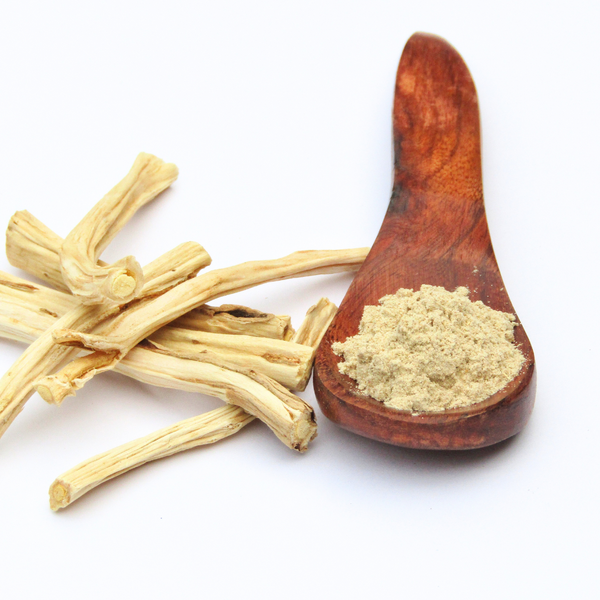
SHATAVARI: A QUEEN AMONG HERBS FOR WOMEN'S WELLNESS
In the realm of Ayurvedic herbs, if ashwagandha is the revered 'King,' shatavari holds the esteemed title of 'Queen.' As a member of the asparagus family, shatavari, also known as Asparagus racemosus or 'wild asparagus,' is an adaptogenic herb renowned for its ability to aid the body in navigating physical and emotional stress. For centuries, shatavari has been a cornerstone of Ayurvedic medicine, valued as a general health tonic that promotes rejuvenation and healing of both body and mind.
Among its many benefits, shatavari holds a special place in women's health, particularly in supporting the female reproductive system. Its restorative properties have been traditionally used to address menstrual irregularities, ease PMS symptoms, and promote hormonal balance. Shatavari's gentle yet potent influence is also believed to enhance fertility and aid in conception.
In Ayurvedic philosophy, shatavari is deeply revered for its calming and harmonizing energy, known as virya. This gentle yet powerful energy permeates the herb, making it an excellent choice for women seeking to cultivate inner balance and resilience.
As a testament to its widespread recognition, shatavari is now available in our Grocery collection, offering a convenient and accessible way to incorporate this remarkable herb into your daily wellness routine. Embark on a transformative journey with shatavari and discover its profound impact on your overall well-being.

Shatavari: Unveiling the Potent Herb for Women's Wellness
The name 'shatavari' carries a rich etymology, derived from the Sanskrit terms 'shat' meaning 'one hundred' and 'avar' meaning 'below,' literally translating to 'one hundred roots.' This aptly reflects the herb's remarkable root system, a testament to its enduring strength and vitality. Another intriguing translation of shatavari is 'who possesses one hundred husbands,' alluding to its folkloric reputation for rejuvenating the female reproductive system.
Dr. David Frawley, in his book 'The Yoga of Herbs,' highlights shatavari's ability to enhance breast milk production and nourish the ovum, underscoring its profound impact on women's health. This revered herb exhibits both nourishing and purifying effects on the female reproductive organs, making it a valuable ally throughout a woman's life cycle.
Shatavari has traditionally been used in Ayurveda to promote female fertility and provide nourishment to both mother and child during pregnancy. Its gentle yet powerful influence is also believed to stabilize a woman's hormonal balance and alleviate symptoms associated with perimenopause and menopause. The herb's abundance of phytoestrogens, precursors to estrogen, plays a crucial role in these benefits. Studies suggest that phytoestrogens can effectively reduce hot flashes, stabilize mood, and maintain bone density, making shatavari a promising natural remedy for osteoporosis prevention. Additionally, shatavari can help restore hormonal balance in women who have undergone hysterectomies.
Beyond its benefits for women, shatavari offers a wealth of advantages for men as well:
- Enhances shukra or semen production
- Aids in rebuilding and replenishing the immune system and body tissues
- Exhibits adaptogenic properties, helping the body and mind cope with stress
- Functions as a nervine sedative and tonic, calming and restoring the nervous system
- Soothes anger and irritability in the mind
- Possesses demulcent properties, bringing moisture to dry and inflamed membranes
- Alleviates constipation, ulcers, and chronic diarrhea
- Supports respiratory health, particularly in cases of dry cough and sore throat
- Provides emollient or moisturizing properties to the skin, making it ideal for dry vata or combination pitta skin types
- Offers topical relief for stiff necks and sore joints
Shatavari is particularly beneficial for vata and pitta constitutions or when one is experiencing an imbalance in these doshas. To determine your dosha type, consider taking our free dosha quiz.

Incorporating Shatavari into Your Wellness Routine
Ayurveda recommends consuming ½ teaspoon of shatavari powder mixed with ½ cup of tepid water twice daily, ideally one to two hours before meals. This method, known as an Ayurvedic churna, allows for a deeper connection with the herb's essence. Engaging all senses – taste, touch, smell, and sight – enhances the earth element within you, fostering a grounded and balanced state of being.
Embrace the transformative power of shatavari and embark on a journey towards holistic wellness.

A Delicious Recipe For ‘Heart Opening’ Shatavari Milk
You will need:
- 1 teaspoon shatavari powder
- 1 teaspoon ghee*
- 1 teaspoon dried rose petals
- ¼ teaspoon cardamom powder
- ¼ teaspoon turmeric powder
- ¼ teaspoon cinnamon powder
- 1 cup milk**
Instructions:
- In a medium saucepan, combine all ingredients.
- Over medium-high heat, slowly whisk the herbs and oil together for 1-2 minutes, or until the turmeric starts to froth.
- Remove from heat and pour into your favorite mug.
- Enjoy as is or with a pinch of jaggery or raw sugar to taste.
Notes:
- Traditionally, Ayurveda recommends ghee for its ojas-building action. However, you can substitute coconut oil for a vegan alternative, such as olive oil or sunflower oil.
- Traditionally, Ayurveda recommends using unpasteurized raw whole cow's milk for its ojas-building properties. However, you can use an alternative milk, such as oat or almond milk.
